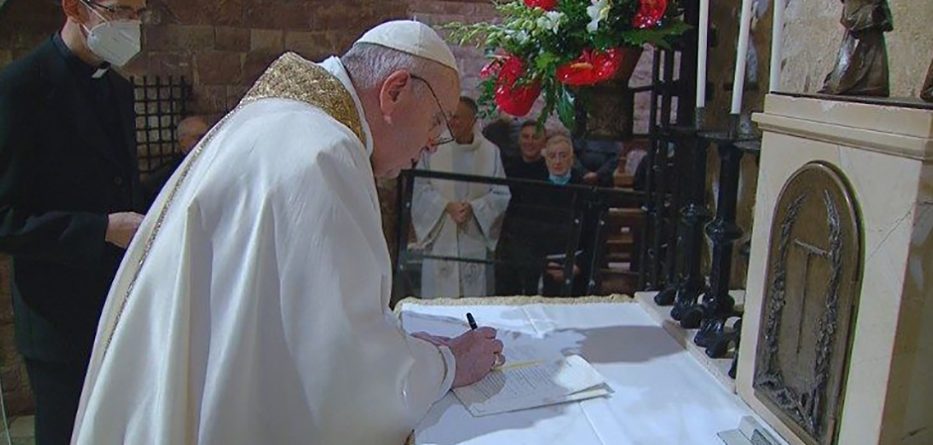As part of its coverage of Fratelli Tutti, the latest encyclical letter from Pope Francis, America Magazine asked a number of theologians and church experts to contribute a brief response, including their perspectives on its potential impact and its particular areas of import.
A Call to Discern the Depths of Our Politics – Vincent Miller
Vincent Miller is Gudorf Chair in Catholic Theology and Culture at the University of Dayton. He is the author of Consuming Religion: Christian Faith and Practice in a Consumer Culture.
Fratelli Tutti is carefully constructed in a way that reveals a distinctive aspect of Pope Francis’ papal ministry. Yes, it powerfully exhorts Christians to pursue the intimacy of social friendship rather than the disposability and indifference of contemporary capitalism or the violent exclusion of populist nationalism. Much deeper than an argument or catechesis, however, the encyclical is a work of spiritual discernment.
Lessons From Fratelli Tutti for the Contemporary United States
Kate Ward is an assistant professor of theological ethics at Marquette University. Her research and teaching focus on economic ethics, virtue ethics and ethical method.
With carefully observed detail, Fratelli Tutti speaks to the chaos, fear and loss that pervade 2020 while sounding a timeless call to become better citizens of our communities, our nations and the globe. Without limiting the future the document envisions, I see three particular challenges to Catholics in the United States.
May U.S. Catholics follow Francis’ lead in recognizing others’ right to be different, even as we dialogue from that difference toward the truth that we all belong to one another.
Just War No More?
Drew Christiansen, S.J., former editor-in-chief of America, is a Distinguished Professor of Ethics and Human Development at Georgetown University and a senior fellow at the Berkley Center for Religion, Ethics and World Affairs.
In his new encyclical Fratelli Tutti, Pope Francis has taken another big step toward distancing the Catholic Church from its traditional support for just war theory. He writes, “It is very difficult nowadays to invoke the rational criteria elaborated in earlier centuries to speak of the possibility of a ‘just war’.”
Fratelli Tutti goes about as far as one can go toward critiquing the notion of just war without rejecting it wholesale. Perhaps the church’s stand on war today might be compared to its position on the death penalty in the 1980s—the beginning of incremental policy steps and statements that may eventually likewise make the idea of a just war “inadmissible.”
Footnoting Fraternity: The Style and Sources of “Fratelli Tutti”
Kevin Ahern is a theological ethicist and president of the Catholic lay movement ICMICA-Pax Romana. He is an associate professor of religious studies at Manhattan College, where he also directed the labour studies program.
Papal footnotes signal to the reader how an official church text is building on the church’s tradition. Footnotes help to illuminate the breadth and the depth of the Catholic tradition, rooting the doctrinal insights on contemporary issues in a centuries-old conversation.
With Fratelli Tutti, Pope Francis again reflects a wider conversation. In addition to many references to Scripture, the encyclical cites 292 sources in 288 footnotes. The majority of these citations, 172, come from his own writing. Laudato Si’ receives the most citations of any single text with 23 references. “Evangelii Gaudium” follows with 22 references. Collectively, his World Day of Peace messages are cited 11 times. Much to the chagrin of his critics perhaps, Francis cites his joint document with Sheikh Ahmed Al-Tayyeb, on “Human Fraternity,” a total of nine times, including a substantial quote at the end (“Fratelli Tutti,” No. 285).
With Fratelli Tutti, Francis again expands the circle of conversation partners beyond bishops and saints, including Karl Rahner, S.J., Paul Ricoeur and, notably, Rabbi Hillel (Nos. 59-60). But is this circle wide enough?
To continue reading this article and the thoughts of the theologians, click here.
With thanks to America Magazine, where this article originally appeared.








